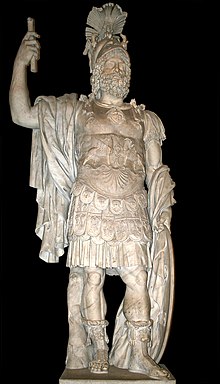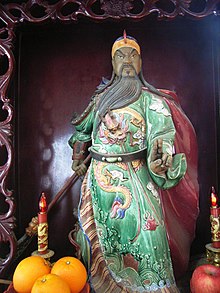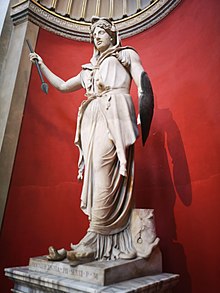List of war deities

Mars, the Roman god of war

Sarutahiko.
A war deity is a god or goddess in mythology associated with war, combat, or bloodshed. They occur commonly in both monotheistic and polytheistic religions.
Unlike most gods and goddesses in polytheistic religions, monotheistic deities have traditionally been portrayed in their mythologies as commanding war in order to spread their religion. (The intimate connection between "holy war" and the "one true god" belief of monotheism has been noted by many scholars, including Jonathan Kirsch in his book God Against The Gods: The History of the War Between Monotheism and Polytheism and Joseph Campbell in The Masks of God, Vol. 3: Occidental Mythology.) [1][2]
The following is a list of war deities.
Contents
1 African mythology
1.1 Ancient Egyptian
1.2 Berber
1.3 East African
1.4 Yoruba
2 Armenian mythology
3 Balkan mythology
4 Baltic mythology
5 Celtic mythology
6 Chinese mythology
7 Etruscan mythology
8 Germanic mythology
8.1 Continental Germanic mythology
8.2 Norse
9 Greek mythology
10 Hindu mythology
11 Hittite mythology
12 Hungarian mythology
13 Japanese mythology
14 Lusitanian mythology
15 Mesopotamian mythology
16 Mongolian mythology
17 Native American mythology
17.1 Aztec mythology
17.2 Maya mythology
17.3 Pacific Northwest
17.4 Plains
18 Nuristani mythology
19 Polynesian mythology
19.1 Hawaiian mythology
19.2 Māori mythology
20 Roman mythology
21 Semitic mythology
22 Slavic mythology
23 Turkic mythology
24 Vietnamese mythology
25 Voodoo
26 References
African mythology
Ancient Egyptian
Anhur, god of war, not a native god
Bast, cat-headed goddess associated with war, protection of Lower Egypt and the pharaoh, the sun, perfumes, ointments, and embalming
Horus, god of the king, the sky, war, and protection
Maahes, lion-headed god of war
Menhit, goddess of war, "she who massacres"
Montu, falcon-headed god of war, valor, and the Sun
Neith, goddess of war, hunting, and wisdom
Pakhet, goddess of war
Satis, deification of the floods of the Nile River and an early war, hunting, and fertility goddess
Sekhmet, goddess of warfare, pestilence, and the desert
Set, god of the desert and storms, associated with war
Sobek, god of the Nile, the army, military, fertility, and crocodiles
Sopdu, god of the scorching heat of the summer sun, associated with war
Wepwawet, wolf-god of war and death who later became associated with Anubis and the afterlife
Berber
Gurzil, Amazigh bull-headed warrior god.[3]
- Ifri, war goddess
East African
Apedemak, Nubian lion-headed warrior god
Maher, Ethiopian god of war
Yoruba
Kokou, powerful Yoruba warrior god
Ogoun, Yoruba deity who presides over fire, iron, hunting, politics, and war
Oya, Yoruba warrior-goddess of the Niger River
Armenian mythology
Anahit, goddess of healing, fertility, wisdom, and water; in early periods associated with war
Balkan mythology
- Danubian Rider
- Sabazios
- Thracian Rider
Baltic mythology
- Kara Māte, Latvian goddess of war
- Kauriraris, Lithuanian god of war and war steeds
- Kovas, Lithuanian god of war
Celtic mythology

Guan Yu, Chinese god of loyalty, righteousness, and valor.
Agrona, reconstructed Proto-Celtic name for the river Aeron in Wales, and possibly the name of an associated war goddess
Andarta, Brittonic goddess theorized to be associated with victory, overcoming enemies, war
Alaisiagae, a pair of goddesses worshiped in Roman Britain, with parallel Celtic and Germanic titles
Andraste, Gaulish warrior goddess
Anann, Irish goddess of war, death, predicting death in battle, cattle, prosperity, and fertility
Bandua, Gallaecian God of War
Badb, Irish goddess of war who took the form of a crow; member of the Morrígan
Belatucadros, war god worshipped by soldiers and equated with the Roman war god Mars
Camulus, god of war of the Belgic Remi and British Trinovantes
Catubodua, Gaulish goddess assumed to be associated with victory
Cicolluis, Gaulish and Irish god associated with war
Cocidius, Romano-British god associated with war, hunting and forests
Macha, Irish goddess associated with war, horses, and sovereignty; member of the Morrígan
The Morrígan, Irish triple goddess associated with sovereignty, prophecy, war, and death on the battlefield
Neit, Irish god of war, husband of Nemain of Badb
Nemain, Irish goddess of the frenzied havoc of war; member of the Morrígan
Rudianos, Gaulish god of war
Segomo, Gaulish god of war
Teutates, British and Gaulish god of war and the tribe
Chinese mythology
Chiyou, god of war
Erlang Shen, a three-eyed warrior
Guan Yu, a historical general from the Han Dynasty who came to be worshiped as god of loyalty, righteousness, and valor
Jinzha, marshal of the center altar
Jiutian Xuannü, goddess of war, sex, and longevity [4]
- Li Jing
Muzha, marshal of the center altar- Nezha
- Wen Qiong [5]
- Yue Fei
Etruscan mythology
Laran, god of war.
Menrva, goddess of war, art, wisdom, and health
Germanic mythology

Idise by Emil Doepler.
Continental Germanic mythology
Baduhenna, a western Frisii goddess of warfare
Idis (Germanic)/itis/ides, the West Germanic cognates of North Germanic dís, they are connected with battle magic and fettering enemy armies
Sandraudiga, goddess whose name may mean "she who dyes the sand red", suggesting she is a war deity or at least has a warrior aspect
Týr, god of war, single combat, law, justice, and the thing, who later lost much of his religious importance and mythical role to the god Wōden
Wōden, god associated with wisdom, poetry, war, victory, and death
Norse
Dís, a group of lesser goddesses who are sometimes connected with battle magic; valkyrie may be a kenning for them
Freyja, goddess associated with love, beauty, fertility, gold, seiðr, war, and death
Odin, god associated with wisdom, war, battle, and death
Týr, god associated with law, justice, victory, and heroic glory
Ullr, god associated with archery, skiing, bows, hunting, single combat, and glory
Valkyries, choosers of the slain and connected to Odin, ruler of Valhalla; they may be the same as the dís above
Greek mythology
Alala, spirit of the war cry
Alke, spirit of courage and battle-strength
Amphillogiai, goddesses of disputes
Androktasiai, spirits of battlefield slaughter
Ares, the main Greek god of war, despised by all the city-states except Sparta
Athena, goddess of wisdom, war strategy, and weaving, more beloved by ancient Greeks than Ares and tutelary deity of Athens, Sparta's rival
Bia, spirit of force and compulsion
Deimos, personification of terror
Enyalius, god of war; in early periods apparently an epithet of Ares, they were differentiated later
Enyo, goddess of war, sometimes appears to be identical to Eris
Eris, goddess of discord and strife
Hera, in the Illiad she has a martial character and fights (and wins) against Artemis; however, this warlike aspect of her appears nowhere else in the surviving corpus, suggesting it was dropped early on
Homados, spirit of the din of battle
Hysminai, female spirits of fighting and combat
Ioke, spirit of onslaught, battle-tumult, and pursuit
Keres, female spirits of violent or cruel death, including death in battle, by accident, murder, or ravaging disease
Kratos, personification of strength and power
Kydoimos, spirit of the din of battle
Makhai, male spirits of fighting and combat
Nike, spirit of victory
Palioxis, spirit of backrush, flight, and retreat from battle
Pallas, Titan god of war-craft and of the springtime campaign season
Perses, the Titan of destruction
Phobos, spirit of panic, fear, flight, and battlefield route
Phonoi, spirits of murder, killing, and slaughter
Polemos, spirit of war
Proioxis, spirit of onrush and battlefield pursuit
Hindu mythology

Kartikeya, god of war by Surendra Nath Ganguly, 1913.
Kartikeya, god of war and battle
Mangala, god of war
Nirrti, goddess of strife
Parvati, her forms Durga and Kali are known for fighting demons
Shiva, god of avenging and destroying and several of his avatars
Vishnu, several of his avatars are associated with fighting and vanquishing evil
Hittite mythology
Shaushka, goddess of fertility, war, and healing
Wurrukatte, god of war
Hungarian mythology
Hadúr, god of war and the metalsmith of the gods
Japanese mythology
Bishamonten, Buddhist god of war
Futsunushi, god of swords, martial arts, and conquest; god of the Mononobe clan
Hachiman Daimyōjin, Shinto god of war (on land) and agriculture, divine protector of the Minamoto clan; mostly worshiped by samurai
Sarutahiko, god of war and misogi; the deity who stands at the junction of Heaven and Earth; one of the main Kunitsukami; actively worshipped by Ueshiba Morihei
Takemikazuchi, god of war, conquest, martial arts, sumo, and lightning; general of the Amatsukami; god of Kashima and Ujigami of Nakatomi clan
Suwa Myōjin (Takeminakata-no-kami), god of valor and duty, protector of the Japanese religion
Lusitanian mythology
Neto, god believed to be associated with war, death, and weaponry
Mesopotamian mythology
Belus, Babylonian god of war
Inanna, Sumerian goddess of sex and war
Ishtar, Assyrian, Akkadian, and Babylonian counterpart to Inanna
Nergal, Babylonian god of war, fire, the underworld, and pestilence
Pap-nigin-gara, Akkadian and Babylonian god of war
Sebitti, group of minor Akkadian and Babylonian war gods
Shala, Akkadian and Babylonian goddess of war and grain
Shara, minor Sumerian god of war
Shulmanu, god of the underworld, fertility, and war
Mongolian mythology
- Dayisun Tngri
Native American mythology
Aztec mythology
- Patterns of War
Mixcoatl, god of war and hunting
Xipe-Totec, god of force, patron of war, agriculture, vegetation, diseases, seasons, rebirth, hunting, trades, and spring; lord of the east
Tlaloc, god of thunder, rain, and earthquakes
Xiuhtecuhtli, god of fire
Huitzilopochtli, god of will, patron of war, fire, and sun; lord of the south
Maya mythology
Tohil, god associated with fire, the sun, rain, mountains, and war
Pacific Northwest
Qamaits, Nuxálk warrior goddess
Winalagalis, Kwakwaka'wakw god of war
Plains
- Morning Star, O-pi-ri-kus by one spelling; the god of war in Pawnee mythology
Nuristani mythology
Great Gish, god of war
Polynesian mythology
'Oro, god of war
Hawaiian mythology
Kū, god of war and birds
Pele, goddess of fire, lightning, dance, volcanoes, and violence
Māori mythology
Tūmatauenga, god of war
Roman mythology

Juno Sospita Statue holding a spear and shield.
Bellona, goddess of war
Honos, god of chivalry, honor, and military justice
Juno, has a consistent martial character and the patron goddess of Rome, the mother of Mars and Bellona
Mars, god of war and agriculture, equivalent to Ares as far as being war gods; aside from this they have very little in common
Minerva, goddess of wisdom, medicine, music, crafts, and war, while somewhat equivalent to the Greek Athena, the Romans did not emphasize her war aspect like the Greeks did
Nerio, warrior goddess and personification of valor
Victoria, personification of victory, equivalent to the Greek goddess Nike
Virtus, god of bravery and military strength
Semitic mythology
Agasaya, "the Shrieker", goddess of war
Anat, goddess of war
Astarte, goddess of sex and war, western Semitic version of the Mesopotamian Ishtar and Inanna
Resheph, god of plague and war
Tanit, main Carthaginian goddess whose functions included war and the moon, a composite of Anat and Astarte/Ishtar/Inanna
Slavic mythology
Jarovit, god of vegetation, fertility, and spring, also associated with war and harvest
Perun, god of thunder and lightning, associated with war
Svetovid, god of war, fertility, and abundance
Zorya Utrennyaya, goddess of the morning star, sometimes depicted as a warrior goddess who protected men in battle
Turkic mythology
Kyzaghan, Turkic deity of war
Vietnamese mythology
Cao Lỗ, god of military innovations- Độc Cước, the protector of coastal settlements. Legend has it that he split himself in two with his axe, each half guards coastal villages against sea ogres.
Thánh Gióng, god of triumph over foreign invaders- Thần Đồng Cổ, the armored protector of the Lý dynasty
Voodoo
Ogoun, loa who presides over fire, iron, hunting, politics, and war
References
^ Kirsch, J. (2004). God Against the Gods: The History of the War Between Monotheism and Polytheism. Viking Compass. ISBN 9780670032860. Retrieved 2015-06-22..mw-parser-output cite.citation{font-style:inherit}.mw-parser-output q{quotes:"""""""'""'"}.mw-parser-output code.cs1-code{color:inherit;background:inherit;border:inherit;padding:inherit}.mw-parser-output .cs1-lock-free a{background:url("//upload.wikimedia.org/wikipedia/commons/thumb/6/65/Lock-green.svg/9px-Lock-green.svg.png")no-repeat;background-position:right .1em center}.mw-parser-output .cs1-lock-limited a,.mw-parser-output .cs1-lock-registration a{background:url("//upload.wikimedia.org/wikipedia/commons/thumb/d/d6/Lock-gray-alt-2.svg/9px-Lock-gray-alt-2.svg.png")no-repeat;background-position:right .1em center}.mw-parser-output .cs1-lock-subscription a{background:url("//upload.wikimedia.org/wikipedia/commons/thumb/a/aa/Lock-red-alt-2.svg/9px-Lock-red-alt-2.svg.png")no-repeat;background-position:right .1em center}.mw-parser-output .cs1-subscription,.mw-parser-output .cs1-registration{color:#555}.mw-parser-output .cs1-subscription span,.mw-parser-output .cs1-registration span{border-bottom:1px dotted;cursor:help}.mw-parser-output .cs1-hidden-error{display:none;font-size:100%}.mw-parser-output .cs1-visible-error{font-size:100%}.mw-parser-output .cs1-subscription,.mw-parser-output .cs1-registration,.mw-parser-output .cs1-format{font-size:95%}.mw-parser-output .cs1-kern-left,.mw-parser-output .cs1-kern-wl-left{padding-left:0.2em}.mw-parser-output .cs1-kern-right,.mw-parser-output .cs1-kern-wl-right{padding-right:0.2em}
^ "Occidental Mythology (Masks of God): Joseph Campbell: 9780140194418: Amazon.com: Books". amazon.com. Retrieved 2015-06-22.
^ Morris, Arnold Hugh Martin Jones, John Robert: The Prosopography of the Later Roman Empire p. 612
^ Cahill, Suzanne E. (18 July 2013). "Sublimation in Medieval China: The Case of the Mysterious Woman of the Nine Heavens". Journal of Chinese Religions. 20 (1): 91–102. doi:10.1179/073776992805307692.
^ http://etheses.lib.cuhk.edu.hk/pdf/004777762.pdf[permanent dead link]